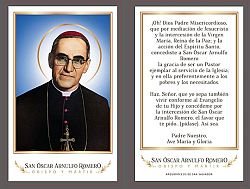Utah will celebrate Thanksgiving Mass for canonization of Archbishop Romero, Pope Paul VI

SALT LAKE CITY — On March 24, 1980 Archbishop Oscar Romero of San Salvador was assassinated as he was celebrating the Mass at the chapel of the Divine Providence cancer hospital, one day after calling on the El Salvador government to end its violation of human rights against the population.
This year, on Oct. 14, Archbishop Romero will be named his country’s first saint as Pope Francis presides at the sanctification ceremony in the Vatican during the Synod of Bishops dedicated to young people.
Pope Paul VI also will be canonized during the ceremony.
The pope, born Giovanni Battista Montini, was beatified on Oct. 19, 2014 at the behest of Pope Francis, while Oscar Arnolfo Romero Galdámez was beatified on May 23, 2015 after a long cause of canonization, first approved by Pope Benedict XVI and then by Pope Francis.
During the ordinary meeting of the Congregation for the Causes of Saints held in Rome on Feb. 6, 2018, the members unanimously recognized the miracle that occurred during the intercession of Blessed Paul VI: a child healed before her birth. In the same way a miracle was examined regarding a pregnant woman and her child, miraculously healed by the intercession of Archbishop Romero, who is often referred to as Msgr. Romero.
In the Catholic Diocese of Salt Lake City a Thanksgiving Mass in honor of the canonizations will take place on Nov. 5 at the Cathedral of the Madeleine, with Bishop Oscar A. Solis presiding.
In Utah, since Pope Francis formally recognized in 2015 that Archbishop Romero was killed “in hatred of the faith” and signed the decree recognizing him as a martyr, the news has been received with joy and a sense of pride by many Salvadorans and by the community in general.
Fr. José A. Barrera Hernandez, pastor of Saint Therese of the Child Jesus Parish in Midvale, was living in El Salvador when Archbishop Romero was assassinated.
“Monsignor Romero gave us a lot of hope and we felt that someone was protecting our human rights,” said Fr. Barrera. “But that morning, after hearing the news [of the assassination], we were just very scared.”
After being appointed Archbishop of San Salvador, Msgr. Romero spoke ever more publicly in defense of the country’s poor and oppressed.
From his pulpit at the cathedral, Msgr. Romero spoke on behalf of the voiceless poor. He told the truth about what was happening in the countryside; he condemned the killings, the torture and the disappearances of community leaders; he demanded justice and set up legal aid projects and pastoral programs to support the victims of the violence.
“He had shaken the pillars of a church that was a bit off in my country,” Fr. Barrera said. “He awakened the interest to serve the underserved, who were not at fault in the causes that began the civil war. This conflict awakened in many families interest in praying and for trusting in God. Only God could help us and protect us from such harsh reality.”
Archbishop Romero also awakened the desire in many young people to put their feet in the same place that Christ did, Fr. Barrera added.
“The fear and cowardice was changed to bravery, after his example of passionate speaking. We were very surprised when we heard his words that he was not afraid to die for the Gospel,” Fr. Barrera said.
Several other diocesan priests are also from El Salvador: Father Marco Tulio Lopez, pastor of Saint Andrew Parish in Riverton, Fr. Oscar Manuel Hernandez-Hernandez, administrator of San Felipe Parish in Wendover, Fr. Jose Fidel Barrera-Cruz, administrator of Our Lady of Guadalupe Parish in Salt Lake City, Fr. Fernando Velasco, administrator of St. Thomas Aquinas Parish in Hyde Park, and Fr. Rafael Murillo, administrator of Notre Dame de Lourdes Parish in Price.
Many local Catholics, including Martin Vazquez, parishioner of Sacred Heart Parish in Salt Lake City, also are originally from El Salvador.
Like Fr. Barrera, Vazquez lived in El Salvador when Msgr. Romero was assassinated.
“He [Msgr. Romero] spoke the truth; he spoke true facts,” said Vazquez. “He was an inspirational leader, committed to justice and willing to make unpopular decisions, and that’s what got him killed. He really was a martyr and died for his love of the Church.”
“In times of difficult coexistence, Msgr. Romero knew to guide, defend and protect his flock,” Pope Francis wrote in a letter that was read during the beatification ceremony.
WHAT: Thanksgiving Mass in honor of the canonization of Pope Paul VI and Archbishop Oscar Romero
WHEN: Monday Nov. 5, at 7 p.m.
WHERE: Cathedral of the Madeleine, 309 East South Temple, Salt Lake City
All are invited.
© Copyright 2025 The Diocese of Salt Lake City. All rights reserved.

Stay Connected With Us